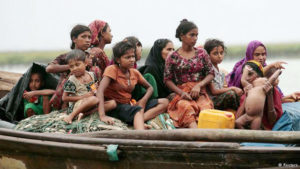Concerns raised over Rohingya repatriation
 Grave concerns are mounting over a plan by Myanmar and Bangladesh to repatriate hundreds of thousands of ethnic Rohingya who fled violence in Myanmar’s western Rakhine State last year.
Grave concerns are mounting over a plan by Myanmar and Bangladesh to repatriate hundreds of thousands of ethnic Rohingya who fled violence in Myanmar’s western Rakhine State last year.
And the move is just the latest in a new trend that is seeing the fundamental principles of refugee protection undermined in an unprecedented way.
The repatriation program was expected to begin on January 22, Myanmar state media has reported, and the two countries say they want to return the more than 650,000 refugees that have fled to restive Rakhine State within two years, according to a statement released by Bangladesh’s Foreign Ministry.
But human rights group Amnesty International called the plan “premature,” and that “returning so soon will be a terrifying prospect” for many Rohingya.
“With memories of rape, killing and torture still fresh in the minds of Rohingya refugees, plans for their return to Myanmar are alarmingly premature,” Amnesty International’s Regional Director for Southeast Asia and the Pacific James Gomez said in a statement.
And refugee expert Dr Jeff Crisp says the move reflects a trend of unsafe returns of refugees.
“One of the most striking characteristics of the Rohingya exodus from Myanmar to Bangladesh has been the speed with which the two states have started to discuss and plan for the refugees’ repatriation.….,” said Dr Crisp of Oxford University’s Refugee Studies Centre.
“Myanmar and Bangladesh continue to express confidence that the repatriation process is on track. Yet Rohingya refugees are extremely reluctant to return to a country where they have been subjected to terrible violence and where they would continue to be deprived of citizenship, rights and economic opportunities. Some have said they would rather die in Bangladesh than return to Myanmar,” Dr Crisp said.
“Almost no details have been released about the way in which Bangladesh and Myanmar would organize and finance the return and reintegration of such a massive refugee population. And the U.N.’s refugee and migration agencies have both been at pains to point out that they have had no involvement in the planning process,” he said.
Large numbers of Rohingya have fled to Bangladesh before, notably in 1978 and 1991. On both occasions, they were forced to return to Myanmar on the basis of bilateral agreements signed between the two countries, with the refugees being expelled from Bangladesh by means of intimidation, physical violence, the use of military force, the withdrawal of food aid and other forms of assistance.
Dr Crisp says the UN’s role in these repatriations was “shameful”.
“The UN refugee agency (UNHCR) was both complicit in and publicly silent about these events. That disregard for the rights and dignity of the Rohingya was encapsulated by a telling comment made by one of the organisation’s senior officials at a meeting I attended in 1992.
“’These are primitive people’, they remarked. ‘At the end of the day they will go where they are told to go’.”
“It is now incumbent on UNHCR to ensure that there is no repetition of these earlier scenarios, insisting that any repatriation that takes place in the future does so in a way that is both voluntary and safe, as stipulated in the organization’s own guidelines on refugee returns. That will require UNHCR to take a robust stand in its dealings with Bangladesh, Myanmar, the E.U. and other donors, all of whom are likely to have other priorities,” Dr Crisp said.
He said the repatriation of the Rohingya refugees was not an isolated example, pointing to Somali refugees in Kenya who have been “encouraged, cajoled and induced to repatriate by threats of camp closure, reduced assistance levels and increased indebtedness”.
“Large numbers of Afghan refugees have been repatriating from Pakistan as a result of harassment and intimidation, despite the deteriorating security situation and diminishing opportunities in Afghanistan,” Dr Crisp said.
“In Cameroon, the military has used strong-arm tactics to expel thousands of refugees who have fled from extremist violence in Nigeria. And in Lebanon, the government and other local actors have been exerting growing pressure on refugees to return to Syria, a country where armed conflict and human rights abuses continue unabated.
“The scale and frequency of involuntary refugee returns in recent years suggest that a fundamental norm of refugee protection is now being challenged as never before,” Dr Crisp said.
Melbourne Rohingya community leader Majid Abdul said no one in his community trusted the Myanmar government.
“If the Rohingya go back to Myanmar at some point, the violence will start again,” Mr Abdul said.
“The Burmese believe we have no place in Myanmar. They do not want us. After everything, we just cannot trust the Burmese government,” he said.
The UN, which has called the bloodshed ethnic cleansing, has said its refugee body is not closely involved in the repatriation process. It said it had urged both countries to make sure the mainly Muslim Rohingya refugees return voluntarily.
Earlier this year, the Myanmar military admitted involvement in the killing of ten Rohingya Muslims found in a mass grave last year in Rakhine State.
Around 650,000 refugees have fled into Bangladesh after accounts of mass killings, systematic rape and the torching of villages by the military and local vigilantes.
Laurie Nowell
AMES Australia Senior Journalist












